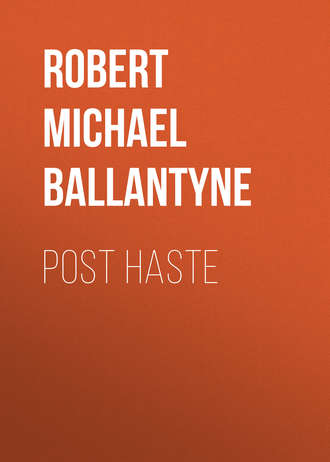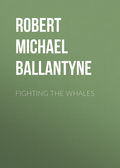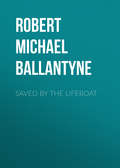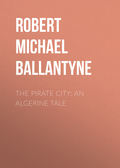
Robert Michael Ballantyne
Post Haste
“Not quite,” said one of the blind officers, with a smile. “It is—Comptroller of the Returned Letter Branch. Some one making inquiries, no doubt, after a lost letter addressed as badly as this one.”
Having looked at a few more of the letters that were then passing under examination, Mr Bright showed them a book in which were copied facsimiles of addresses which had passed through the post. Some of these were pictorial—embracing quaint devices and caricatures, most of them in ink, and some in colours, all of which had been traced by a gentleman in the office with great skill. One that struck May as being very original was the representation of an artist painting the portrait of the Queen. Her Majesty was depicted as sitting for her portrait, and the canvas on the easel before which the artist stood was made the exact size of the postage-stamp.
While the ladies were examining this book of literary curiosities, Mr Bright took occasion to comment with pardonable pride on the working of the Post-Office.
“You see, ma’am,” he said, “we do our best for the public—though many of ’em have no idea of it. We don’t send letters to the Returned Letter Branch till we’ve tried, as you see, to get the correct addresses, and until two separate letter-carriers have attempted to deliver them. After leaving the letter-carriers’ hands, the address of every undelivered letter, and the indorsement it bears, are carefully examined by a superior officer, who is held responsible for discovering any wrong treatment it may have undergone, and for having recourse to any further available means of finding the owner. It is considered better that the sender of a letter should know as soon as possible of its non-delivery, than that it should travel about with little prospect of its owner being found. We therefore send it to the Returned Branch without further delay, where it is carefully examined by a superior officer, to see that it has actually been presented as addressed, and that the reasons assigned for its non-delivery are sufficient. In doubtful cases the Directories and other books of reference in the branch are consulted, and should it be found that there has been any oversight or neglect, the letter is immediately re-issued. After all has been done that can be to deliver such letters, they are opened, and returned the same day to the senders. If valuables are enclosed, the address and contents are recorded in case of inquiry. When senders fail to give their addresses, sometimes these are discovered by bills of exchange, cheques, or money-orders, which happen to be enclosed. When addresses of senders can be discovered by information on the outside of covers, the letters are returned without passing through the Returned Letter Branch, and are not opened. When all efforts have failed, and the letters do not contain property, they are not preserved.”
“Do many letters come into the Returned Letter Offices in this way?” asked Miss Lillycrop.
“Ay; over the whole kingdom, including the letters sent direct to the senders last year, there were above four millions eight hundred thousand, and of these we managed to return nine-tenths to the writers, or re-issued them to corrected addresses.”
“Oh, indeed!” said Miss Lillycrop, utterly bewildered.
“A large proportion of the letters passing through this office,” said Mr Bright, “consists of circulars. An account of these was once taken, and the number was found to be nearly twenty millions a year, and of these circulars it was ascertained that—”
“Stop! pray, sir, stop!” exclaimed Miss Lillycrop, pressing her hand to her forehead; “I am lost in admiration of your amazing memory, but I—I have no head for figures. Indeed, what I have already heard and seen in this place has produced such confusion in my poor brain that I cannot perceive any difference whatever between millions, billions, and trillions!”
“Well, come, we will continue our round,” said Mr Bright, laughing.
Now, while all this was going on in the hall, there was a restive creature inside of a box which did not relish its confinement. This was Mr Fred Blurt’s snake.
That sagacious animal discovered that there was a knot in the side of his pine-wood box. Now, knots are sometimes loose. Whether the snake found this out, and wrought at the knot intentionally, or forced it out accidentally during its struggles, we cannot tell, but certain it is that it got it out somehow, made its escape, and glided away into the darkest corner it could find.
Meanwhile its box was treated after the manner of parcels, and put safely into one of the mail-bags.
As the mass of letters began to diminish in bulk the snake began to feel uncomfortably exposed. At the same time Miss Lillycrop, with that wicked delight in evil prophecy which is peculiar to mankind, began to feel comfortably exultant.
“You see I was right!” she said to her guide, glancing at the clock, which now indicated ten minutes to eight; “the confusion is almost as great as ever.”
“We shall see,” replied Mr Bright, quietly, as he led the way back to the gallery.
From this point it could be seen, even by unpractised eyes, that, although the confusion of letters all over the place was still considerable, there were huge gaps on the sorting-tables everywhere, while the facing-tables were of course empty. There was a push and energy also which had not prevailed at first. Men seemed as though they really were in considerable haste. Letters were being bundled up and tied with string and thrust into bags, and the bags sealed with a degree of celerity that transfixed Miss Lillycrop and silenced her. A few minutes more and the tables were cleared. Another minute, and the bags were being carried out. Thirty red vans outside gaped to receive them. Eight o’clock struck, whips cracked, wheels rattled, the eight o’clock mail was gone, and there was not a single letter left in the great sorting-room of St. Martin’s-le-Grand!
“I was right, you see,” said Mr Bright.
“You were right,” responded Miss Lillycrop.
They descended and crossed the now unencumbered floor. The snake took it into its mottled head at that moment to do the same. Miss Lillycrop saw it, shrieked, sprang to get out of its way, fell, and sprained her ankle!
There was a rush of sorters, letter-carriers, boy-sorters, and messengers; the snake was captured, and Miss Lillycrop was tenderly borne from the General Post-Office in a state of mental amazement and physical collapse.
Chapter Fourteen.
Formation of the Pegaway Literary Association and Other Matters
Close to the residence of Solomon Flint there was a small outhouse or shed, which formed part of the letter-carrier’s domain, but was too small to be sub-let as a dwelling, and too inconveniently situated in a back court to be used as an apartment. It was therefore devoted to the reception of lumber. But Solomon, not being a rich man, did not possess much lumber. The shed was therefore comparatively empty.
When Philip Maylands came to reside with Solomon, he was allowed to use this shed as a workroom.
Phil was by nature a universal genius—a Jack-of-all-trades—and formed an exception to that rule about being master of none, which is asserted, though not proved, by the proverb, for he became master of more than one trade in the course of his career. Solomon owned a few tools, so that carpentry was naturally his first attempt, and he very soon became proficient in that. Then, having discovered an old clock among the lumber of the shed, he took to examining and cleaning its interior of an evening after his work at the Post-Office was done. As his mechanical powers developed, his genius for invention expanded, and soon he left the beaten tracks of knowledge and wandered into the less trodden regions of fancy.
In all this Phil had an admirer and sympathiser in his sister May; but May’s engagements, both in and out of the sphere of her telegraphic labours, were numerous, so that the boy would have had to pursue his labours in solitude if it had not been for his friend Peter Pax, whose admiration for him knew no bounds, and who, if he could, would have followed Phil like his shadow. As often as the little fellow could manage to do so, he visited his friend in the shed, which they named Pegaway Hall. There he sometimes assisted Phil, but more frequently held him in conversation, and commented in a free and easy way on his work,—for his admiration of Phil was not sufficient to restrain his innate insolence.
One evening Phil Maylands was seated at his table, busy with the works of an old watch. Little Pax sat on the table swinging his legs. He had brought a pipe with him, and would have smoked, but Phil sternly forbade it.
“It’s bad enough for men to fumigate their mouths,” he said, with a smile on his lip and a frown in his eye, “but when I see a thing like you trying to make yourself look manly by smoking, I can’t help thinking of a monkey putting on the boots and helmet of a Guardsman. The boots and helmet look grand, no doubt, but that makes the monkey seem all the more ridiculous. Your pipe suggests manhood, Pax, but you look much more like a monkey than a man when it’s in your mouth.”
“How severe you are to-night, Phil!” returned Pax, putting the pipe, however, in his pocket; “where did you graduate, now—at Cambridge or Oxford? Because w’en my eldest boy is big enough I’d like to send ’im w’ere he’d acquire sitch an amazin’ flow of eloquence.”
Phil continued to rub the works of the watch, but made no reply.
“I say, Phil,” observed the little fellow, after a thoughtful pause.
“Well?”
“Don’t it strike you, sometimes, that this is a queer sort of world?”
“Yes, I’ve often thought that, and it has struck me, too, that you are one of the queerest fish in it.”
“Come, Phil, don’t be cheeky. I’m in a sedate frame of mind to-night, an’ want to have a talk in a philosophical sort o’ way of things in general.”
“Well, Pax, go ahead. I happen to have been reading a good deal about things in general of late, so perhaps between us we may grind something out of a talk.”
“Just so; them’s my ideas precisely. There’s nothin’,” said Pax, thrusting both hands deeper into his trousers pockets, and swinging his legs more vigorously—“nothin’ like a free an’ easy chat for developin’ the mental powers. But I say, what a fellow you are for goin’ ahead! Seems to me that you’re always either workin’ at queer contrivances or readin’.”
“You forget, Pax, that I sometimes carry telegraphic messages.”
“Ha! true, then you and I are bound together by the cords of a common dooty—p’r’aps I should say an uncommon dooty, all things considered.”
“Among other things,” returned Phil, “I have found out by reading that there are two kinds of men in the world, the men who push and strive and strike out new ideas, and the men who jog along easy, on the let-be-for-let-be principle, and who grow very much like cabbages.”
“You’re right there, Phil—an’ yet cabbages ain’t bad vegetables in their way,” remarked Pax, with a contemplative cast of his eyes to the ceiling.
“Well,” continued Phil gravely, “I shouldn’t like to be a cabbage.”
“W’ich means,” said the other, “that you’d rather be one o’ the fellows who push an’ strive an strike out noo ideas.”
Phil admitted that such were his thoughts and aspirations.
“Now, Pax,” he said, laying down the tool with which he had been working, and looking earnestly into his little friend’s face, “something has been simmering in my mind for a considerable time past.”
“You’d better let it out then, Phil, for fear it should bu’st you,” suggested Pax.
“Come, now, stop chaffing for a little and listen, because I want your help,” said Phil.
There was something in Phil’s look and manner when he was in earnest which effectually quelled the levity of his little admirer. The appeal to him for aid, also, had a sedative effect. As Phil went on, Pax became quite as serious as himself. This power of Pax to suddenly discard levity, and become interested, was indeed one of the qualities which rendered him powerfully attractive to his friend.
“The fact is,” continued Phil, “I have set my heart on forming a literary association among the telegraph-boys.”
“A what?”
“A literary association. That is, an association of those boys among us who want to read, and study: and discuss, and become knowing and wise.”
The daring aspirations suggested by this proposition were too much for little Pax. He remained silent—open mouthed and eyed—while Phil went on quietly to expound his plans.
“There is a capital library, as you know, at the Post-Office, which is free to all of us, though many of us make little use of it—more’s the pity,—so that we don’t require a library of our own, though we may come to that, too, some day, who knows? Sure it wouldn’t be the first time that great things had come out of small beginnings, if all I have read be true. But it’s not only books we would be after. What we want, Pax, is to be organised—made a body of. When we’ve got that done we shall soon put soul into the body,—what with debates, an’ readings, an’ lectures, an’ maybe a soirée now and then, with music and speeches, to say nothing of tea an’ cakes.”
As Phil Maylands warmed with his subject his friend became excited. He ceased to chaff and raise objections, and finally began to see the matter through Phil’s rose-coloured glasses.
“Capital,” he exclaimed heartily. “It’ll do, Phil. It’ll work—like everything else you put your hand to. But”—here his chubby little visage elongated—“how about funds? Nothin’ in this world gets along without funds; an’ then we’ve no place to meet in.”
“We must content ourselves with funds of humour to begin with,” returned Phil, resuming his work on the watch. “As for a meeting-room, wouldn’t this do? Pegaway Hall is not a bad place, and quite enough room in it when the lumber’s cleared out o’ the way. Then, as to members, we would only admit those who showed a strong desire to join us.”
“Just so—who showed literary tastes, like you an’ me,” suggested Pax.
“Exactly so,” said Phil, “for, you see, I don’t want to have our society flourished about in the eyes of people as a public Post-Office affair. We must make it private and very select.”
“Yes, uncommon select,” echoed Pax.
“It would never do, you know,” continued the other, “to let in every shallow young snipe that wanted to have a lark, and make game of the affair. We will make our rules very stringent.”
“Of course,” murmured Pax, with a solemn look, “tremendously stringent. For first offences of any kind—a sousin’ with dirty water. For second offences—a woppin’ and a fine. For third—dismissal, with ears and noses chopped off, or such other mutilation as a committee of the house may invent. But, Phil, who d’yee think would be suitable men to make members of?”
“Well, let me see,” said Phil, again laying down his tools, and looking at the floor with a thoughtful air, “there’s Long Poker, he’s a long-legged, good-hearted fellow—fond o’ the newspapers.”
“Yes,” put in Pax, “Poker’ll do for one. He’d be a capital member. Long and thin as a literary c’racter ought to be, and pliable too. We could make a’most anything of him, except a fire-screen or a tablecloth. Then there’s Big Jack—he’s got strong sedate habits.”
“Too fond of punning,” objected Phil.
“A little punishment in the mutilation way would stop that,” said Pax.
“And there’s Jim Brown,” rejoined Phil. “He’s a steady, enthusiastic fellow; and little Grigs, he’s about as impudent as yourself, Pax. Strange, isn’t it, that it’s chiefly little fellows who are impudent?”
“Wouldn’t it be strange if it were otherwise?” retorted Pax, with an injured look. “As we can’t knock people down with our fists, aren’t we justified in knockin’ ’em down with our tongues?”
“Then,” continued Phil, “there’s George Granger and Macnab—”
“Ah! ain’t he the boy for argufyin’ too?” interrupted Pax, “and he’ll meet his match in Sandy Tod. And there’s Tom Blunter—”
“And Jim Scroggins—”
“An’ Limp Letherby—”
“An’ Fat Collins—”
“An’ Bobby Sprat. Oh!” exclaimed Pax, with a glowing countenance, “we’ve got lots o’ first-rate men among the message-boys, though there are some uncommon bad ’uns. But we’ll have none except true-blues in our literary association.”
The society thus planned was soon called into being, for Philip Maylands was one of those determined characters who carry their plans into execution with vigour and despatch. His first move was to seek counsel of Mr Sterling, a city missionary—the same who had directed George Aspel to the abode of Abel Bones on the night of that youth’s visit to Archangel Court,—with whom he had become acquainted on one of his visits to Miss Lillycrop. That good lady was a staunch ally and able assistant of many city missionaries, and did much service in the way of bringing them into acquaintance with people who she thought might be helpful to them, or get help from them. A mutual liking had sprung up between Mr Antony Sterling and Phil on that occasion, which had ripened into friendship.
“You’ll help us at our first meeting, won’t you?” asked Phil, after they had talked the matter over.
“Yes, if you wish it,” replied Mr Sterling. “But I won’t come at the beginning. I’ll drop in towards the close, and won’t say much. You’d best begin the work by yourselves. I’ll come to your aid whenever you seem to require it. But have a care how you start, Phil. Whatever the other members may do, remember that you, as the originator of the association, are bound to lay the foundations with the blessing of God.”
Phil did not neglect this all-important point, and, having obtained permission from Solomon Flint to use the shed, the society was soon auspiciously commenced with a lively debate, in Pegaway Hall, as to the best method of conducting its own affairs. On this occasion Philip Maylands proved himself to be an able organiser. Long Poker showed that he had not dabbled in newspapers without fishing up and retaining a vast amount of miscellaneous knowledge. Jim Brown roused the meeting to a pitch of enthusiasm almost equal to his own. Little Grigs made stinging remarks all round, and chaffed little Pax with evident delight. Macnab disputed with everybody. Sandy Tod argued and objected more or less to everything, while Tom Blunter, Jim Scroggins, Limp Letherby, Fat Collins, and Bobby Sprat, lent more or less effectual fire to the debate. Big Jack did not speak much. He preferred, as he said, to form a large audience, but, if he might be permitted to offer an opinion, would suggest that less talk and more action might facilitate the despatch of business, and that they ought to try to emulate the House of Commons by allowing a little common sense to mingle with their discussions.
As for Peter Pax, he assumed the rôle of peacemaker-general. When the debaters seemed to be getting too warm, he rose to order; and, in a calm dignified manner, commented on the conduct of the disputants with such ineffable insolence as to draw down their wrath on his devoted head—to the great delight of the other members. Thus he threw oil on the troubled waters, and, generally, kept the meeting lively.
Finally, the laws of the Pegaway Literary Association were fixed, the plan of meetings was arranged, and the whole thing fairly started.
The society worked well for a time, but after the various members had done their best, as Pax said, to keep the pot boiling, it was felt and suggested that they should seek a little aid from without. A reading or a lecture was proposed, seconded, and carried. Then came the question who should be asked to read or lecture. Macnab proposed that their chairman should endeavour to procure a lecturer, and report to next meeting. Sandy Tod objected, and proposed a committee to consider the subject. Phil Maylands said he had anticipated the demand, and had already secured the promise of a lecturer—if the members chose to accept him.
“Name! name!” cried several voices.
“Our excellent landlord, Solomon Flint,” said Phil. “You all know his admirable powers of memory, and his profound knowledge of men and things (‘At least if you don’t, you ought to,’ from Pax), and you may be sure he’ll give us something good.”
“And proverbial,” added little Grigs.
“Ay, Flint will certainly strike fire out of whatever he tackles,” said Big Jack.
(“Order!” from Pax.)
“When is he to give it?” asked one.
“Won’t fix the time just yet,” said Phil.
“What’s his subject?” asked another.
“Can’t say; not yet decided.”
With this uncertainty as to time and subject the association was obliged to rest content, and thereafter the meeting was dissolved.
We are grieved to be obliged to state that the society thus hopefully commenced came to a premature close at an early period of its career, owing to circumstances over which its members had no control.
Some time before that sad event occurred, however, Solomon Flint delivered his discourse, and as some of the events of that memorable evening had special bearing on the issues of our tale, we shall recur to it in a succeeding chapter.







